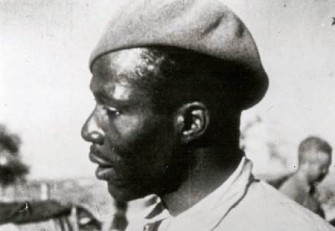 By William L. Katz
By William L. Katz
Oliver Law, at 33-years-old, became the first Black commander of an American army.
On June 12, 1937, Law was selected by a committee of three white officers to lead the Abraham Lincoln Brigade, an integrated army.
Never heard of Oliver Law?
Hardly surprising. Law’s not mentioned in school textbooks or social studies classes, and has not found a place in most college texts or history courses. But Law made his mark on world history in June 1937. He was among a brave band of 2,800 American men and women — including 90 other African Americans — who rushed to help the Spanish Republic during its Civil War (1936-1938). Their aim was to stop Hitler and Mussolini from using Spain as a springboard for their march across Europe to begin World War II.
Law and his fellow Americans were joined by 30,000 other men and women from 52 countries who were volunteering their lives to save Spain’s Republican government from being overwhelmed by Hitler and Mussolini and their Spanish fascist ally, General Francisco Franco.
This remains the only time in world history a global volunteer force left their homelands to defend democracy in a distant land. This volunteer army included black and white men and women who at home in America had united during the Great Depression to fight for unemployment insurance, union rights and social security, and to end to segregation, discrimination, and lynching.
Though few volunteers had any military training their goal was to prod their own governments to stop fascist aggression then and there. England, France, the United States and other democratic governments were doing nothing about fascism — except encouraging it. So individuals decided to do something.
Among the U.S. volunteers — known as the “Abraham Lincoln Brigade” — military experience ran a low fourth to enthusiasm, commitment and sheer guts. But Oliver Law was different — he had plenty of experience.
In Texas, he had served six years in the Buffalo Soldiers, “U.S. Colored Troops.” He served during the long night of U.S. segregation and lynching that lasted through World War II and beyond. Indeed, U.S. War Department policy prevented Law from becoming an officer or reaching higher than corporal.
But in Spain life was different for African Americans. “I can rise according to my worth, not my color,” Law said. After the Lincoln Brigade’s first battle at Jarama, Law’s courage was rewarded with a promotion to lieutenant. Next he was put in charge of a machine-gun company. Then Lincoln Brigade Commander Marty Hourihan recommended him for officers’ school.
When the Lincoln Brigade Commander position became available on June 12, a committee of three white Brigade officers voted to make Law a captain and their brigade commander. One of the three, Steve Nelson, who had worked with him in Chicago, told why they picked Law: “He had the most experience and was best suited for the job.” Further, he was “the most acquainted with military procedures on the staff at the moment . . . he was well liked by his men . . . .”
Nelson continued, “When soldiers were asked who might become an officer — ours was a very democratic army — his name always came up. It was spoken of him that he was calm under fire, dignified, respectful of his men and always given to thoughtful consideration of initiatives and military missions.”
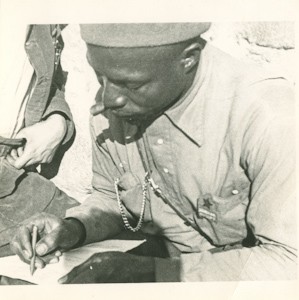
Oliver Law behind the lines.
The rest of the story is sadder — for Law, the Lincoln Brigade, the international volunteers, and the world. At 10 a.m. on July 9, 1937 at the Battle of Brunete, Commander Law insisted on leading his men against a fortified fascist position at Mosquito Ridge. Law was “running to the top of the hill,” waving his men on, said his runner, New Yorker Harry Fisher. Law did not “attempt to protect himself, and in a matter of seconds, machine-gun fire ripped into him.” Law’s other runner, New Yorker Jerry Weinberg, crawled across the battlefield to pull Law to safety. It was too late: “He died less than an hour later,” Fisher recalled.
Oliver Law’s comrades buried him under a sign that proudly declared him the first black commander of a U.S. military unit.
Hitler, Mussolini, and Franco defeated democracy in Spain and five months later, Nazi Germany’s Panzer divisions marched into Poland and began World War II. Had the democracies heeded the warning of the 35,000 volunteers, the story of World War II might have been different.
Though Oliver Law and a majority of the Americans died in Spain, survivors returned home to again fight fascism after Pearl Harbor. Now only a handful of war veterans — they’re in their nineties now — of the Lincoln Brigade are left. They honor Law’s legacy by continuing to battle racism in the United States and opposing imperialist wars abroad.
—By William Loren Katz, from his book, The Lincoln Brigade: A Picture History, which is based on research and interviews with Brigade veterans Steve Nelson, Harry Fisher, Sam Walters, and two trips to Spain with these daring veterans and their families.

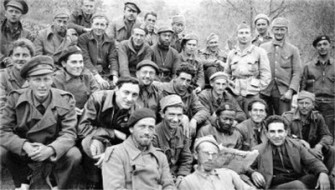
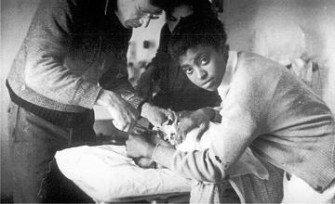

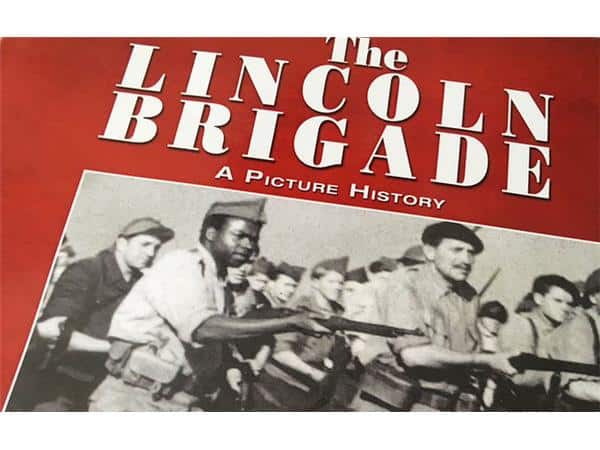
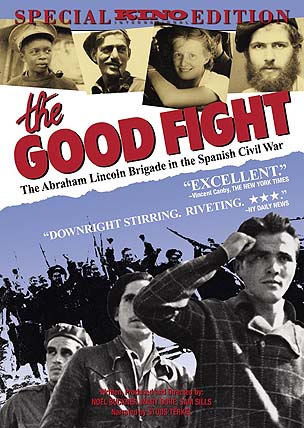





Canadian volunteers in the International Brigades who survived the war came home to find themselves tagged by the Cdn government as ‘premature anti-fascists’ and were consequently ignored and forgotten.
We have always been interested in Oliver Law – an amazing man! I grew up in the next apartment to a man who had fought with the Abraham Lincoln Brigade, a friend of my mother’s. I was taught about the Brigade in earliest childhood. I wish Paul Robeson had been able to make his film about Law – more people need to know about him, and about the Spanish Civil War, which might have prevented the further rise of fascism if the US had supported the republicans and the International Brigades who fought Franco!